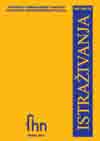SUBVERZIVNOST ROMANA DERVIŠ I SMRT, TVRĐAVA I KRUG
SUBVERSIVENESS OF NOVELS DERVISH AND DEATH, FORTRESS, AND CIRCLE
Author(s): Nedžad DedovićSubject(s): Literary Texts
Published by: Fakultet humanističkih nauka, Univerzitet »Džemal Bijedić« u Mostaru
Keywords: subversiveness; criticism; demystification; irony; ideology; dogma; profanity; polarization we-they; antiideological character; parallelization religion-Party; parabolic character; discreditable government; moral crash; control; self-destruction
Summary/Abstract: Subversiveness of Selimović’s novels is reflected in criticism, irony and demystification of authorities and power centers (with emphasis on government), and all ideological and canonical systems, their promoters and protectors. The aim is to break the illusion of unquestionableness and infallibleness of all ossified system, revisit any dogma and ideology and any stereotyped thinking that stands in the way of humanity and freedom of opinion. Elements of demystification and irony are the strongest in Circle (Krug) with respect to their provocation, directness and actuality. There is a clear parallel between religion and the Party in this novel, and along with irony it is the beginning of the destruction of inviolable,”sacred” concepts such as Party and ideology. Specifically, the subversive elements presented through characters of Vladimir’s uncle Janko and Čizmić emphasize closemindedness and dogmatic basis of the Party that is just a modified religion. Novel Circle, especially in view of its subversiveness, creates a parabolic relation to modern times – the time of communist Yugoslavia (Selimović had announced such a novel saying that he would write a novel about “this time”). Of course, Circle is not just a story about that time – as well as two other novels it reveals universal meanings and patterns of behavior, actions and governance. Novels Fortress (Tvrđava) and Dervish and the Death (Derviš i smrt) are specific to polarization we-they, which is an extremely important sociolinguistic element in the concept of subversiveness. The usage of pronouns in the third person plural means that subordinate groups label the dominant ones – in order to express their differentiation, resistance and negative attitude. The ultimate aim is to enhance aggression towards the opposite, elitist group. Displaying abuse (manipulation) and profanity of positive ideas, events and characters, belongs to subversive elements of Selimović’s novels (in Circle, for instance, there is manipulation with the fallen partisans – festivities are organized in the “name of their glory” to promote the Party and its leaders; former exemplary revolutionaries are now treading on pure ideas of the revolution for which they fought – Pudar, Nina’s father). Criticism of governance is manifested in alienated authority – i.e. in the large gap, distance and hostility of the ruling structures towards citizens, and emphasizing the lack of civil rights (religious festivities are masked by Nina’s parents, Vladimir’s uncle only on his deathbed may express his religiosity). Discredit of the Party and its leaders is made clear in storytelling about the great social inequality, privilege of party members and their children, the persecution of those who point out the negative aspects of the ruling elite, and the decline of morality of Party ideologues.
Journal: Istraživanja
- Issue Year: 2012
- Issue No: 07
- Page Range: 133-148
- Page Count: 16
- Language: Bosnian

